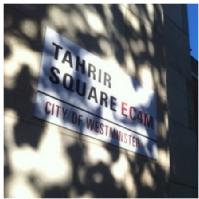Plenary 1
‘Tahrir Square, EC4M: the occupation movement and the dramaturgy of public order’
Sophie Nield (Royal Holloway)
 |
On 15 October 2011, a group of anti-cuts and anti-capitalist protestors set up camp on the steps of St Paul’s Cathedral in the City of London. Inspired by the Tahrir Square protest, which took place in Cairo as part of the Arab Spring, and the burgeoning Occupy Wall Street demonstration, this action in the City of London was one of hundreds of protests staged simultaneously across the world. Various claims have been made for these occupations: that they reclaim public space from the dominance of corporate capitalism; that they are creating an alternative site for the ‘99%’ to make themselves heard; that they materialise a global resistance to a global financial crisis in a way that has not been possible before. This paper will read the occupation as an explicitly theatrical tactic of resistance, opening up questions of appearance, representation and spectatorship in the public sphere, and offering some thoughts on the materiality of symbolic action, and, particularly, the function of policing in the dramaturgy of public order. |
‘Missing the Person’
Jenny Edkins (Aberystwyth)
Stories of the missing offer profound insights into the tension between how political systems see us and how we see each other. The search for people who go missing as a result of war, political violence, genocide, or natural disaster reveals how forms of governance that objectify the person are challenged. Contemporary political systems treat persons instrumentally, as objects to be administered rather than as singular beings: the apparatus of government recognizes categories, not people. In contrast, relatives of the missing demand that authorities focus on a particular person: families and friends are looking for someone who to them is unique and irreplaceable. And yet, when someone goes missing we often find that we didn't know them as well as we thought: there is a sense in which we are "missing" even to our nearest and dearest and even when we are present, not absent.
